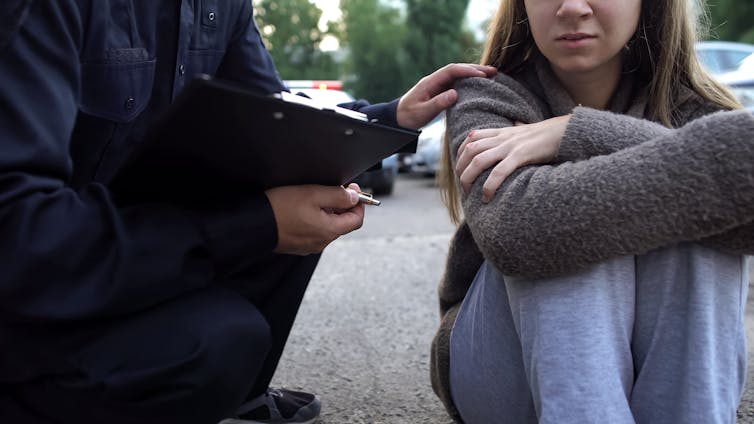Jurisdictions around the world are struggling with rising police calls to deal with people with mental health issues, and New Zealand is no exception.
Over the past five years, the number of police calls to mental health incidents has increased by 64% to 77,043.
Despite the latest budget providing extra funding for 500 frontline police officers, the situation is unlikely to improve.
There are growing calls for a different approach, one that provides a health-led response to all mental health events, but uncertainty remains about what this will look like in practice.
Our research shows that a shift to a trauma-informed support system could be a game changer, which could significantly reduce police involvement and improve support for distressed individuals.
The study involved researchers from a range of universities across New Zealand, working with New Zealand Police and people who had been interacted with by police whilst experiencing mental distress.
We spoke to 28 individuals to hear about their experiences interacting with police, with a particular focus on how officers helped or hindered them when they were struggling mentally.

Getty Images
To better understand policing in this context, we accompanied 53 police shifts and spoke to 73 officers. We also analysed the content of 70 111 emergency calls categorised as related to mental health.
The overall findings will help identify how change can and should be considered and applied in New Zealand.
Chronic underfunding creates tension in police
Police were found to be extremely frustrated by the chronic underfunding of mental health services, which one officer explained leads to a self-fulfilling prophecy:
I think as police officers, we’re go-getters, we love to get out there, go to work, and help people, so in some ways, we might be doing ourselves a disservice because we know that no one else is going to help us.
But an analysis of 111 calls found that mental health or social service providers could lead most responses, without the need for police.
The changes would require rethinking emergency responses to mental health crises and welfare checks, in which police routinely visit people’s homes to check on their safety.
In our sample, no calls were transferred to the Early Mental Health Response 24/7 triage line managed by Whakarongorau, a national telehealth service.
Minister for Mental Health Matt Doocy has proposed setting up an easily accessible national mental health hotline alongside fire and emergency services when calling 111, and our research has found that this is worth considering.
Alternative approaches must acknowledge trauma
Whatever the proposal, the people who shared their stories with us recognised past trauma as a cause of their psychological distress, and they emphasised that it was crucial that police were equipped to recognise this.
One participant, Anna, sent a strong message about what this means for police:
When you speak to someone who is suffering, remember that you are speaking to all of their trauma; the trauma of their parents and ancestors. Māori in particular are still experiencing the effects of colonization and intergenerational trauma. Instead of asking what is wrong with this person, try to ask what happened to this person. This removes judgement and allows this person to express their wounds.
While police often feel they need more specialized training, the survey found that it’s basic humanitarian response that matters most to the people they serve.
When police officers tried to connect with people, understand them, show respect and genuine concern, and explain how they were helping, people said they felt less anxious and their relationships with police improved.
Criminalizing emotional distress
However, not all interactions with police were positive: all participants expressed concern about the criminalization of unwell individuals who had not committed a crime (the use of handcuffs, cells, cars, dogs).
Kelly vividly remembers the embarrassment and cumulative pain she felt when police approached her in public.
The police came and stormed the bus, or so I felt as I sat curled up on the floor. They handcuffed me and dragged me off the bus, on one of the busiest roads in the city.
Experiences of criminalisation were mixed with instances of prejudice, racism and discriminatory responses, including by the police.
Sometimes, when family members hear the name of a loved one, they make preconceived judgments about that person or family, rather than understanding the reasons behind the criminal act.
Some participants feared police involvement, including reporting a crime, which is concerning given that individuals experiencing psychological distress may be particularly vulnerable.
Change is needed inside and outside the police force
When police adopt a trauma-informed approach that includes basic human qualities, they can minimize experiences of criminalization and reduce re-traumatization.
Annie explained what this type of policing means to her:
The woman spoke to me and asked me what had happened. We sat down and talked. I felt like I was a human being. I didn’t feel like a criminal or a non-human. They treated me like a human being. Not even someone with a bad condition.
Alternative approaches are likely to involve police, even if security requires minimal involvement. Police need to confidently use trauma-informed approaches that emphasise humanitarian engagement across frontline policing.


